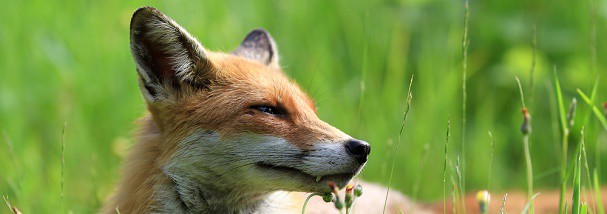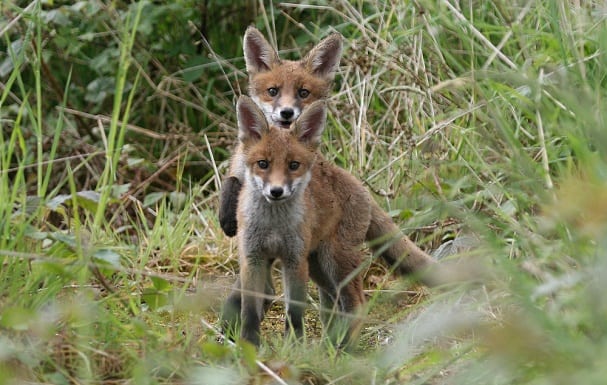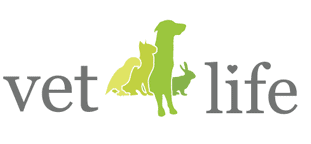 Orphan season is usually from March until August each year. This is when there are a high number of wildlife young born such as baby hedgehogs, fox cubs, badger cubs, fawn and lots of baby birds. Each animal has a variety of ways they help their babies grow up and leave their home, venturing into the big wide world. Baby animals may seem as if they have been abandoned, even though their parents are often very close by. Although it is tempting to assist these babies in acts of kindness, we recommend leaving them where they are and contacting your local wildlife rescue centre for advice. Wildlife Aid in Leatherhead is nearest to Teddington (their number is 09061 800132).
Orphan season is usually from March until August each year. This is when there are a high number of wildlife young born such as baby hedgehogs, fox cubs, badger cubs, fawn and lots of baby birds. Each animal has a variety of ways they help their babies grow up and leave their home, venturing into the big wide world. Baby animals may seem as if they have been abandoned, even though their parents are often very close by. Although it is tempting to assist these babies in acts of kindness, we recommend leaving them where they are and contacting your local wildlife rescue centre for advice. Wildlife Aid in Leatherhead is nearest to Teddington (their number is 09061 800132).
General advice
If an animal is injured or distressed, we can offer some general advice to enable you to help the animal in the best way possible:
- First of all NEVER handle badgers, foxes or deer by yourself. Call your local wildlife rescue centre immediately and they will often come to treat the animal at the sight.
- We would recommend keeping a large towel and cardboard box in the boot of your car at all times, as an animal's stress levels can be greatly reduced by covering them with a towel.
- We would advise keeping your local wildlife rescue number easily accessible.
- Always keep birds away from your face as their beaks can cause injuries.
- Take care with some birds such as Birds of prey, as these have powerful Talons and can cause severe injury.
- Always wear gloves when handling wildlife
- Where possible, move dead bodies from the road so other wildlife are not put at danger.
Advice for particular species
Deer
Baby deer are often left in hidden or open locations by their parents for up to 8 hours a day. If they are touched by humans the mother will not return and is likely to end up abandoning her young. Do not approach the fawn, simply observe it from a distance and call the wildlife rescue team.
Please don't ever handle adult deer by yourself – please call a local wildlife hospital for advice. All species of deer can be very dangerous and should only be handled by experts. Even if it doesn't have antlers (which can cause serious harm), their powerful legs can inflict injuries and, in the case of Muntjac deer, their ‘’tusks" (downward-pointing, very long canine teeth) can inflict severe damage. These tusks can be hard to see and of course tusks are not usually associated with deer! There have been cases where even experienced handlers have been permanently disabled by such injuries.
Vixens
Vixens often move fox cubs and hide them for a number of hours before returning to them. The fox cubs make lots of noise so the Vixen can locate them and return to the cubs.
 Birds
Birds
Fully feathered baby birds can often find their way to the ground when they are learning to fly. They are often still being fed by their parents so watch out for their parents' return. If they are partially or completely unfeathered, they can be placed back into the nest or even placed in a cardboard box in a close-by tree or even the washing line. This keeps them away from danger but allows their parents to continue to feed them. Baby swifts, swallows or house martins are difficult birds to care for in captivity and need specialist care. Please call the wildlife team immediately and follow instruction carefully.
Amphibians
For amphibians such as frogs and toads - if uninjured, find a safe place to release them. If they are injured, handle with gloves and take them to a wildlife centre for treatment.
Bats
Take extra care when handling bats. Never handle them as they can carry disease and their wings are very easily damaged. Never try to catch a flying bat but once landed you can place a container over the bat and gently slide a piece of paper or cardboard underneath to contain them inside. Call a wildlife centre immediately for advice.
Our nearest wildlife centre is Wildlife Aid in Leatherhead (their number is 09061 800132). Request calling them for advice before touching wildlife, rather than putting them through the additional trauma of being transported. Please always call from the scene of the injured animal.


